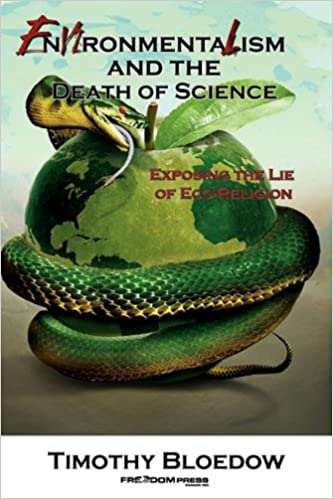Canadian writer Timothy Bloedow’s book is a powerful, full throttled exposé of the modern environmental movement. But more than that: not just critiquing a scientific movement, the book identifies a full blown politico-religious movement ‘in direct competition with Christianity’. Environmentalists are ‘much more concerned about implementing a social and ideological revolution than they are about animals and the environment’.
It is a tall accusation for such a short book, but with ‘newspaper in one hand and Bible in the other’ Mr Bloedow pulls together much disturbing evidence to make a strong case that should set the alarm bells ringing, not just across the church, but for anyone with a genuine concern for truth.
Bloedow does a fine job of juxtaposing environmental ‘end is nigh-ism’ and biblical revelation, finding the former apocalyptic view entirely bereft of scriptural support. He reminds us that ‘God’s relationship with the created order is predicated on his relationship with man’ (p.95) and that man is the ‘crown of God’s creation’.
‘AIDS of the Earth’
He then observes how the biblical view stands in stark contrast to modern environmentalism, which ‘treats man as a cancer, a virus, and a blight on the Earth’ (p.26). The author cites numerous key examples to underscore the point, including environmentalist Paul Watson’s famous description of humans as ‘the AIDS of the Earth’.
Based on evidence that environmentalists are set on preventing the developing world escaping poverty through industrialisation (as the West has done), Bloedow provides examples of how ‘hatred for humanity is mainstream thinking in the environmentalist movement'(p.22).
Particularly telling for Christians should be Bloedow’s quote from Patrick Moore, co-founder of (and now long departed from what he describes as a deeply ‘politicised’) Greenpeace: ‘The environmental movement has evolved into the strongest force there is for preventing development in the developing countries’.
Bloedow contends that modern environmentalism being short on real science and actual facts and long on speculation and prophetic insight has more in common with religious faith than science. Plenty of evidence is adduced including the widespread reluctance of leading environmental alarmists –– Al Gore and David Suzuki among others – to debate their views publicly.
‘Fragile earth’
Bloedow also challenges the much vaunted eco-notion of a ‘fragile earth’, providing key examples of how God’s ‘resilient earth’ consistently refutes Green alarmism over ‘centuries of environmental catastrophe’. He points out how, after such man-made disasters as the Exxon Valdez oil spill, the environment took only weeks to recover.
Indeed, there is a helpful chapter entitled ‘What Is Pollution?’ highlighting how pollution is essentially ‘a form of waste’ which is a ‘natural part of life’ rather than a ‘man-made evil’, and that technology always finds ways of coping with it. Yet he notes that environmentalists continually use the word ‘pollution’ pejoratively.
Above all, we learn that carbon dioxide –– Public Enemy Number One for enviro-alarmists –– is actually not a pollutant at all but a key element in one of God’s feedback loops. God set up ‘people and animals breathing oxygen and expelling carbon dioxide as a waste product; vegetation then taking that carbon dioxide as a “food” source, and expelling oxygen as a waste product'(pp. 58-59).
Bloedow notes: ‘Elementary science reveals to us that carbon dioxide, as the “food” which sustains life, is the elixir of life.’ He provides support for this from the signatures of 31,000 of the world’s scientists, each with at least a BSc degree and 9,000 with a PhD, all of whom confirm that carbon dioxide is ‘actually a benefit to the environment’ (see www.petitionproject.org) (p.69).
‘Environmentalism’, says Bloedow, is by turns ‘fundamentally hostile to free markets and private property … utopian … spurn[ing] real-world considerations such as practical benefit analyses and practical trade-offs’ (p.8).
In this he sees the ‘obvious influence of secular humanism’ in its ‘deference’ to ‘big-government solutions’ which are ‘characterized by conservatives as a watermelon – green on the outside, but red (communistic) on the inside’ (pp.14-15).
Pantheism
Bloedow sees environmentalism as more than secular humanism, however. He believes it ‘may be the transitional movement to Pantheism’, noting the dualism inherent in its antithesis of nature (creation) as both good and evil. He explains, ‘fear-mongering about what is “man-made” as opposed to what is supposedly “natural” is part of the pantheistic mythology that is central to environmentalism’ (p.48).
He has a valid point. Certainly the ‘end is nigh-ism’ of countless generations living in fear of the ‘angry gods’ of nature (note the recent success of the ludicrous Revenge of Gaia thesis of Professor James Lovelock) have always drawn a crowd.
I would like to have seen a chapter on the mass media’s culpable role in the wholesale failure to make the modern environmental movement accountable. Journalists, it seems, are attack dogs when it comes to politicians, but are sheep when scientific speculation is invoked as fact.
What Timothy Bloedow does through his important book is take on the role of ‘watchman’. He warns us how the exuberant and youthful eco-movement of the 40s and 50s, that attracted so many who genuinely cared for the environment, has metamorphosed into a highly politicised, manipulative, pseudo-religion, often in opposition to major Christian doctrines.
He has done the church an immeasurably important service. Necessarily hard-hitting, his book successfully highlights how environmentalism is the latest incarnation of the most ancient of movements: that which supplants the worship of the Creator with the worship of the created.








